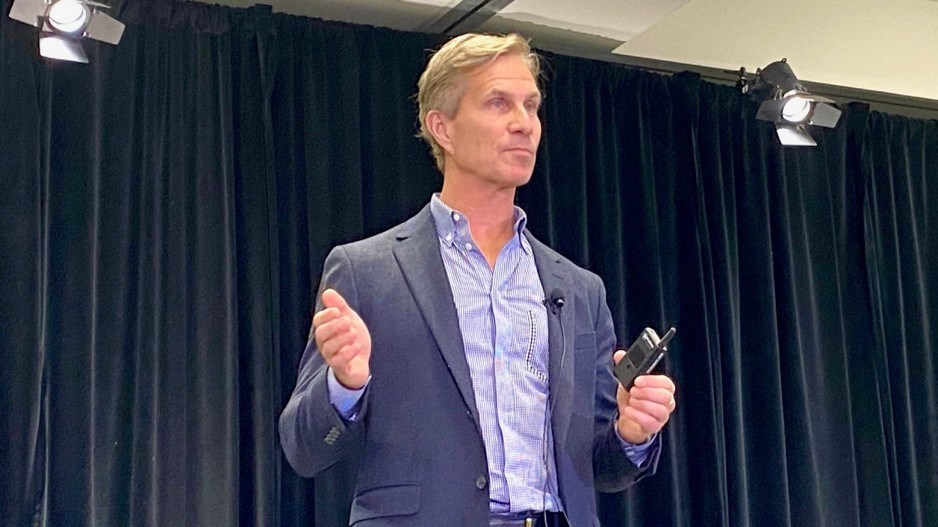Gold prices were up 13 per cent in 2023, while lithium prices fell more than 80 per cent, according to the periodic table of commodities returns published by U.S. Global Investors.
And yet miners and junior explorers in the gold space got “hammered” in terms of attracting investment in 2023, said Peter Grosskopf, CEO of SCP Resource Finance, and former CEO of Sprott Inc. (NYSE,TSX: SII).
“With the exception of the giant caps, almost every junior gold development company and explorer was hammered, with a few notable exceptions,” said Grosskopf at a keynote speech Tuesday at the Association of Mineral Exploration Roundup conference.
“Don’t give up hope,” he added. “From what I can see, investors are adding gold, particularly, every month to their portfolios to hedge against government debt.”
As long as governments and banks keep devaluing their own currencies through monetary policies like quantitative easing, investors will put their money into assets that governments can’t artificially inflate or deflate, he suggested.
“The only hedge against that is to own assets that they can’t print,” Grosskopf said. “For everyone in this room, that’s gold, that’s silver, that’s bitcoin.
“Eventually this translates into resurgence of investor interest in this sector – in precious metals. I think it’s going to come during 2024. I cannot see 2024 ending without a record price in gold.”
The former CEO of Sprott Inc., Grosskopf led the buyout of Sprott Capital Partners last year to form SCP Resource Finance, an investment broker specializing in mining.
He noted that, in 2023, mining underperformed commodity prices. Despite the zeal for energy transition metals, institutional investors have lately fled the minerals space.
“The capital markets aren’t working the way they used to,” Grosskopf said. “I think what happened in 2023 is we lost our support of the institutional investors.”
Mining and commodities are inherently cyclical, and institutional investors simply don’t like the volatility that goes with that, Grosskopf said.
“Mining sector funds, for the most part, are a fraction of the size that they were 10 years ago,” he said. “We’ve lost specialist support for the sector, and we’ve lost the big names in the sector that used to make or break company fortunes – the Eric Sprotts of the world.
“The star culture of these managers that invest in these large precious metal funds are just not there anymore. And what’s replaced them? ETFs. We just do not have a healthy precious metals speciality sector.”
He also said that pension funds and large endowments may like the minerals sector, but "just can’t handle the volatility.”
“As a result of all this, mining equities have dramatically underperformed commodity prices.”
The junior exploration sector may need to rethink the way it raises money, he suggested.
“I think that the days of going on a roadshow with a broker and thinking that’s the only you’re going to raise money are over,” he said. “It’s just simply not the way a lot of institutions invest anymore, and it’s not the way a lot of retail investors invest anymore.”
Corporate access has become a preferred way for investing firms to learn about companies, he said. Corporate access firms provide this connection, he said.
“That’s an industry that provides a very important function these days.”
He added that the mining majors are increasingly hungry for new projects.
“We are in an M and A market,” he said. “Every major company is looking at every development project that could make the most difference in their pipeline. I think that the majors have never been busier in their corporate development departments.”
Grosskopf said Canadian governments could do a better job of improving the investment climate for Canadian exploration and development companies by simply supporting and championing mining the way Australia does. Australian government support for mining includes encouraging low interest loans for the sector and encouraging pension funds to invest in Australian miners.
“In sa国际传媒, and in sa国际传媒 in particular, we need to do a better job of engaging government, and government needs to do a better job of engaging our industry," Grosskopf said.
“The government should be championing this industry. What’s the easiest way to do it? Well, if there’s a really good project and it works environmentally, approve it quickly.”
“It’s time to champion mining as a national industry.”
As for specific commodities, Grosskopf noted that certain energy transition metals – notably lithium and nickel – have been subject of bubbles recently.
“The heat’s coming out of the sector to a degree,” he said. “But this is not going away. This is hundreds of billions of investment that will be deployed.”
He is also bullish for uranium.
“I don’t see it going away,” he said. “I think that governments have finally come to the conclusion that they need uranium, not just as a factor, but as a leader in the energy transition.”



